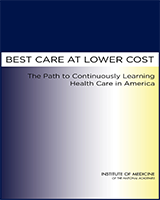NCBI Bookshelf. A service of the National Library of Medicine, National Institutes of Health.
Committee on the Learning Health Care System in America; Institute of Medicine; Smith M, Saunders R, Stuckhardt L, et al., editors. Best Care at Lower Cost: The Path to Continuously Learning Health Care in America. Washington (DC): National Academies Press (US); 2013 May 10.

Best Care at Lower Cost: The Path to Continuously Learning Health Care in America.
Show detailsHealth care in America presents a fundamental paradox. The past 50 years have seen an explosion in biomedical knowledge, dramatic innovation in therapies and surgical procedures, and management of conditions that previously were fatal, with ever more exciting clinical capabilities on the horizon. Yet, American health care is falling short on basic dimensions of quality, outcomes, costs, and equity. Available knowledge is too rarely applied to improve the care experience, and information generated by the care experience is too rarely gathered to improve the knowledge available. The traditional systems for transmitting new knowledge—the ways clinicians are educated, deployed, rewarded, and updated—can no longer keep pace with scientific advances. If unaddressed, the current shortfalls in the performance of the nation's health care system will deepen on both quality and cost dimensions, challenging the well-being of Americans now and potentially far into the future. Health care needs major improvements with respect to its ability to meet patients' specific needs, to offer choice, to adapt, to become more affordable, to improve—in short, to learn. Americans should be served by a health care system that consistently delivers reliable performance and constantly improves, systematically and seamlessly, with each care experience and transition.
In the face of these realities, the Institute of Medicine (IOM) convened the Committee on the Learning Health Care System in America to explore the most fundamental challenges to health care today and to propose actions that can be taken to achieve a health care system characterized by continuous learning and improvement. This report, Best Care at Lower Cost: The Path to Continuously Learning Health Care in America, explores the imperatives for change, the emerging tools that make transformation possible, the vision for a continuously learning health care system, and the path for achieving this vision. The title of the report underscores that care that is based on the best available evidence, takes appropriate account of individual preferences, and is delivered reliably and efficiently—best care—is possible today, and also is generally less expensive than the less effective, less efficient care that is now too commonly provided.
The foundation for a learning health care system is continuous knowledge development, improvement, and application. Although unprecedented levels of information are available, patients and clinicians often lack access to guidance that is relevant, timely, and useful for the circumstances at hand. Overcoming this challenge will require applying computing capabilities and analytic approaches to develop real-time insights from routine patient care, disseminating knowledge using new technological tools, and addressing the regulatory challenges that can inhibit progress.
Engaged patients are central to an effective, efficient, and continuously learning system. Clinicians supply information and advice based on their scientific expertise in treatment and intervention options, along with potential outcomes, while patients, their families, and other caregivers bring personal knowledge on the suitability—or lack thereof—of different treatments for the patient's circumstances and preferences. Both perspectives are needed to select the right care option for the patient. Communication and collaboration among patients, their families, and care teams are needed to fully address the issues affecting patients.
Health care payment policies strongly influence how care is delivered, whether new scientific insights and knowledge about best care are diffused broadly, and whether improvement initiatives succeed. New models of paying for care and organizing care delivery are emerging to improve quality and value. While evidence is conflicting on which payment models might work best and under what circumstances, it is clear that high-value care requires structuring incentives to reward the best outcomes for patients.
Finally, the culture of health care is central to promoting learning at every level. Creating continuously learning organizations that generate and transfer knowledge from every patient interaction will require systematic problem solving; the application of systems engineering techniques; operational models that encourage and reward sustained quality and improved patient outcomes; transparency on cost and outcomes; and strong leadership and governance that define, disseminate, and support a vision of continuous improvement.
Achieving the vision of continuously learning health care will depend on broad action by the complex network of individuals and organizations that make up the current health care system. Missed opportunities for better health care have real human and economic impacts. If the care in every state were of the quality delivered by the highest-performing state, an estimated 75,000 fewer deaths would have occurred across the country in 2005. Current waste diverts resources from productive use, resulting in an estimated $750 billion loss in 2009. It is only through shared commitments, with a supportive policy environment, that the opportunities afforded by science and information technology can be captured to address the health care system's growing challenges and to ensure that the system reaches its full potential. The nation's health and economic futures—best care at lower cost—depend on the ability to steward the evolution of a continuously learning health care system.
- Abstract - Best Care at Lower CostAbstract - Best Care at Lower Cost
- Biosketches of Committee Members and Staff - Best Care at Lower CostBiosketches of Committee Members and Staff - Best Care at Lower Cost
- Imperative: Achieving Greater Value in Health Care - Best Care at Lower CostImperative: Achieving Greater Value in Health Care - Best Care at Lower Cost
Your browsing activity is empty.
Activity recording is turned off.
See more...